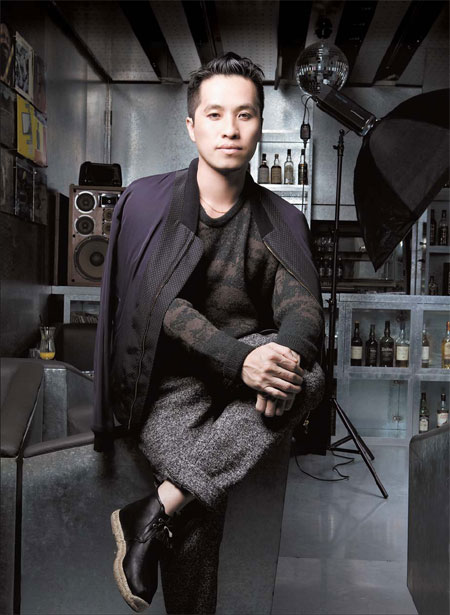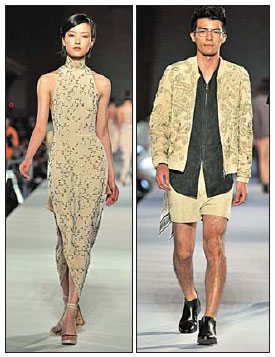Life and Leisure
Chinese-American style icon
By Gan Tian (China Daily)
Updated: 2010-11-07 08:41
 |
Large Medium Small |


One of the hottest names in fashion is Phillip Lim, the new darling of the American catwalk. Gan Tian explores his success story.
Top models and celebrities were out in force, and the fashion runway was perched on top of Dongbianmen, a 600-year-old landmark in Beijing. This was Chinese-American fashion designer Phillip Lim's first show in Beijing, and he was wowing the gathered fashionistas with his collection of slim-cut jackets, black-and-white shirts, loose pants, leather bags and gloves. His outfits were hanging on the country's top models, including Du Juan, who was making a rare appearance at home with Lim's white qipao-inspired evening dress, shimmering with diamonds. Also on the catwalk were top models Pei Bei, Sun Feifei and Qin Shupei. And right with them were A-list celebrity guests Geng Le, actress Gong Beibi and Japanese football player and fashion icon Hidetoshi Nakata.
For designer Phillip Lim, the show was "paying tribute to my homeland" and his Chinese ancestry.
"It is the perfect time to introduce us to Beijing. My partner and I are both Chinese, and my parents came from the mainland. We are amazed by what's happening in Beijing and how fast things are changing," the 36-year-old says.
Lim founded his own label with Wen Zhou in the autumn of 2005. Because the two were both 31 at that time, they named it 3.1 Phillip Lim.
To illustrate the label's core value, they chose a white rose as the logo - simple and elegant.
But it was not until 2007 that success came. On a morning during the New York Spring/Summer Fashion Week, Anna Wintour, editor-in-chief of American Vogue, had her assistant wake Lim up, saying she wanted to take a look at his collections.
Later, she promised Lim that he was "sure to succeed", and if he needed any supermodels, to just give her a call.
Lim soon shone under the spotlight. Celebrities like Cameron Diaz, Nicole Richie and Scarlett Johansson added jackets, short skirts and evening dresses from 3.1 Phillip Lim to their wardrobes.
He was named the best new designer by the Council of Fashion Designers of America (CFDA) in 2007. The same year, his first flagship store opened at SOHO, New York, and Wintour came to celebrate and congratulate the young designer.
Lim seldom uses traditional Chinese icons such as the color red or dragon and phoenix symbols, but he believes Chinese culture is deeply rooted in him.
"Chinese design is not about an exclusive garment. It's about mystery, essentiality, intrigue and a quiet appeal that is yet loud and powerful," he says.
These ideas came with his education. Lim is the youngest child and when he was growing up, the whole family depended on his mother, who worked as a tailor in a factory.
Lim's mother had hoped he would become a lawyer, a doctor or a banker.
"I lived two lives. In the day when I went to school, it was Western culture, but when I was back home, it was completely Chinese. We spoke Chinese, ate Chinese and I was taught to respect the elders. This was always something I grew up with," Lim says.
He admits that this conflict was the push factor. In five years, the designer had expanded his business to 400 boutiques and stores in more than 50 countries.
Now his designs are everywhere. His latest fan is "Queen Bee" Leighton Meester, who was spotted wearing a Phillip Lim shorts-skirt in a scene of TV's Gossip Girl.
Women who love Lim's designs have a preference for simplicity. He believes a simple dress is the hardest to make, and he is spare on details, so much so that his creations give the illusion of looking basic. But his inspiration is drawn from an eclectic range.
It can be from works of art with depth like when he presented a collection inspired by Picasso's work Mosqueteros during the 2010 Paris Spring Fashion Week.
Or he looks for inspiration from street culture, or the films made by Hong Kong director Wong Kar-wai.
People may jump to the conclusion that his Asian designs stem from his Chinese heritage, but Lim says: "I don't design Chinese clothes. I design global clothes."
Another generality that dogs him is the growing success of Asian names such as Jimmy Choo, Vera Wang, Jason Wu and Alexander Wang, which some dismiss as a transient vogue.
Lim does not think it is a trend.
" The Chinese have been in fashion since when there was no fashion. It only means there are more opportunities now. It's not coincidence, and there is no real connection except the fact that we are all of Asian descent."
(China Daily 11/07/2010 page14)